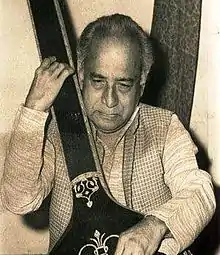Vasantrao Deshpande
Vasantrao Deshpande (2 May 1920 – 30 July 1983)[1] was a Hindustani classical vocalist renowned for his contribution to natya sangeet (musical dramas)[2]
Vasantrao Deshpande वसंतराव देशपांडे | |
|---|---|
 | |
| Background information | |
| Born | 2 May 1920 Murtijapur, Akola, Maharashtra |
| Died | 30 July 1983 (aged 63) Pune, Maharashtra, India |
| Genres | Hindustani classical music, Khayal, Natya Sangeet, Thumri, Ghazal, Tappa |
| Occupation(s) | Singer, actor, musician |
| Instruments | Vocals |
| Years active | 1928–1983 |
| Website | vasantraodeshpande |
Background
Vasantrao was born into Deshastha Brahmin family[3] in Murtizapur, Akola District, in Vidarbha region of the state of Maharashtra in India. At the age of eight, Deshpande's talent was observed by Bhalji Pendharkar who launched him in the role of Krishna in the Hindi movie Kaliya Mardan (1935).[4] He obtained his PhD in Music.
Gurus
Deshpande learned from several gurus, refusing to tie himself down to a single school of singing.[5]
He began his musical training with Shankarrao Sapre of Gwalior, a disciple of V. D. Paluskar,[6] in Nagpur. After this, he studied under various musicians such as Sureshbabu Mane of Kirana gharana, Asad Ali Khan of Patiala gharana, Aman Ali Khan and Anjanibai Malpekar of Bhendibazaar gharana, and Ramkrishna Vaze of Gwalior.[7] Dinanath Mangeshkar, a direct disciple of Vazebuwa, is said to have had the greatest influence over Deshpande. Deshpande is regarded as Mangeshkar's sole musical heir, having adopted his signature mercurial and dramatic style of singing.
Career
Deshpande performed classical and semi-classical music. He acted in movies like "Kaaliya Mardan", "Dudh Bhaat", and "Ashtavinayak". He had several commercial releases under his name.[8] He created raga Raj Kalyan, a variant of Yaman without pancham.
Deshpande's students include Chandrakant Limaye,[9] Vijay Koparkar and Pt Padmakar Kulkarni.[10]
Legacy
His grandson, Rahul Deshpande, is also a singer, and has also reprised some of his roles on stage and screen, such as Khansaheb in Katyar Kaljat Ghusli (film).[11][12]
Recognition
A foundation, the Dr. Vasantrao Deshpande Pratishthan,[13] organizes an annual music festival, Vasantotsav, at Pune in his memory. The annual festival is held over three days during the month of January, where musicians and performers are invited to take part.[14] During the festival, two awards, the "Vasantotsav Youth Award" for Promising Artists and the "Vasantotsav Award" for veteran artists, are given.[15][16]
In 2011, a three-day music and dance festival in his memory, was organized by the South Central Zone Cultural Centre (SCZCC) of Government of India in Nagpur.[17]
A film named Mee Vasantrao,[18] based on the life of Vasantrao Deshpande, was scheduled to be released on 1 May 2020, but was postponed due to Covid-19 lockdown.
Awards
Filmography
Film
| Year | Title | Role | Notes |
|---|---|---|---|
| 1935 | Kaliya Mardan | Krishna | First film performance |
Theatre
| Year | Production | Role | Producer | Notes |
|---|---|---|---|---|
| 1967 | Katyar Kaljat Ghusli | Khansaheb | Purushottam Darvhekar | Over 1000 performances by 1976.[20] |
Bibliography
- "Vasantrao Deshpande: Marathi Stage Phenomenon". Bhavan's Journal. Bharatiya Vidya Bhavan. 1983. pp. 25–28.
References
- Lokrajya (39 ed.). Directorate-General of Information and Public Relations. 1983. pp. 13, 15, 20.
- Sangeet Natak (Issues 79–92 ed.). Sangeet Natak Akademi. 1986. p. 47.
- The Illustrated Weekly of India, Volume 95. Bennett, Coleman & Company, Limited, at the Times of India Press. 1974. p. 31.
ARATHI literature is strewn with the names of Deshastha writers.The popular classical and light musician, DrVasantrao Deshpande, also from this community. Other schools of music are well represented by such veterans as Pandit Narayanrao Vyas, Meera Khirwadkar, Gururao Deshpande and musicologist Vamanrao Deshpande G. V. Bhonde, popularly known as " Nakalakar", gave mimicry the status of an art in Maharashtra. Famous actor and director Gajanan Jagirdar, Prabhakar Panshikar, magician Raghuvir Bhople all belong to this community.
- http://www.vdeshpandehall.com/history.php
- Mathur, Barkha (3 July 2016). "Vidarbha has rich tradition of Hindustani classical music". The Times of India.
- Misra, Susheela (January 1990). Some immortals of Hindustani music. ISBN 9788185151144.
- Jeffrey Michael Grimes (2008). The Geography of Hindustani Music: The Influence of Region and Regionalism on the North Indian Classical Tradition. pp. 160–. ISBN 978-1-109-00342-0. Retrieved 17 July 2013.
- Michael S. Kinnear (1985). A discography of Hindustani and Karnatic music. Greenwood Press. p. 294. ISBN 978-0-313-24479-7. Retrieved 17 July 2013.
- http://sabmumbai.com/ptchandrakant/about.html
- https://underscorerecords.com/artistes/detail/108/Pushkar-Lele
- "Grandson Rahul to carry Pt Vasantrao's legacy forward". The Times of India. 28 August 2009. Retrieved 17 July 2013.
- Sangeet Natak, Issues 79–82. Sangeet Natak Akademi. 1986. p. 47.
- Pranav Kulkarni (23 December 2008). "Vasantotsav to kick off from January 9". The Indian Express. Retrieved 17 July 2013.
- "Celebrating the five elements of nature". Pune Mirror. 23 December 2008. Retrieved 17 July 2013.
- "Vasantotsav to start on Jan 18". The Times of India. 6 January 2013. Retrieved 17 July 2013.
- "Season of Music". The Indian Express. 21 January 2012. Retrieved 17 July 2013.
- "Music festival in memory of Vasantrao Deshpande in Nagpur". IBN Live News. 28 July 2011. Retrieved 17 July 2013.
- https://www.imdb.com/title/tt11960634/
- "SNA: List of Akademi Awardees". Sangeet Natak Akademi Official website. Archived from the original on 30 May 2015. Retrieved 17 January 2016.
- Kasbekar, Asha (2006). Pop Culture India!: Media, Arts, and Lifestyle. ISBN 9781851096367.